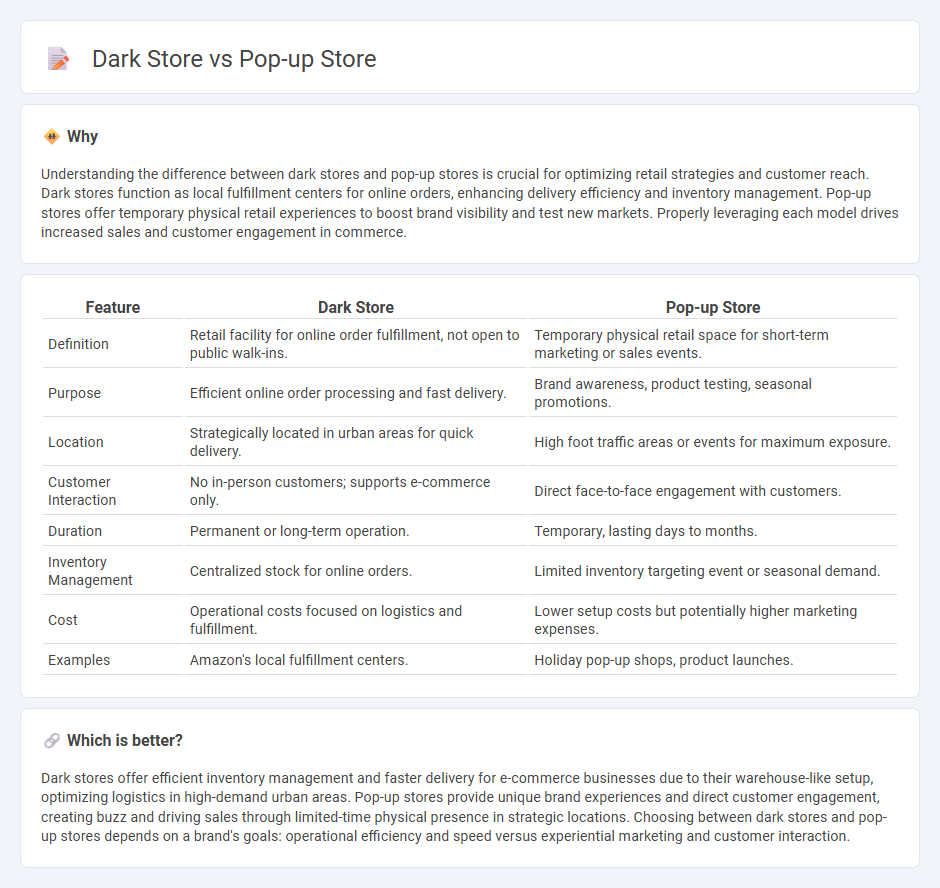
Dark stores operate as fulfillment centers exclusively for online orders, optimizing inventory management and speedy delivery without customer-facing retail space. Pop-up stores serve as temporary retail locations designed to create urgency and test markets for new products while engaging customers directly. Explore the distinct advantages and strategic uses of dark stores and pop-up stores in modern commerce.
Why it is important
Understanding the difference between dark stores and pop-up stores is crucial for optimizing retail strategies and customer reach. Dark stores function as local fulfillment centers for online orders, enhancing delivery efficiency and inventory management. Pop-up stores offer temporary physical retail experiences to boost brand visibility and test new markets. Properly leveraging each model drives increased sales and customer engagement in commerce.
Comparison Table
| Feature | Dark Store | Pop-up Store |
|---|---|---|
| Definition | Retail facility for online order fulfillment, not open to public walk-ins. | Temporary physical retail space for short-term marketing or sales events. |
| Purpose | Efficient online order processing and fast delivery. | Brand awareness, product testing, seasonal promotions. |
| Location | Strategically located in urban areas for quick delivery. | High foot traffic areas or events for maximum exposure. |
| Customer Interaction | No in-person customers; supports e-commerce only. | Direct face-to-face engagement with customers. |
| Duration | Permanent or long-term operation. | Temporary, lasting days to months. |
| Inventory Management | Centralized stock for online orders. | Limited inventory targeting event or seasonal demand. |
| Cost | Operational costs focused on logistics and fulfillment. | Lower setup costs but potentially higher marketing expenses. |
| Examples | Amazon's local fulfillment centers. | Holiday pop-up shops, product launches. |
Which is better?
Dark stores offer efficient inventory management and faster delivery for e-commerce businesses due to their warehouse-like setup, optimizing logistics in high-demand urban areas. Pop-up stores provide unique brand experiences and direct customer engagement, creating buzz and driving sales through limited-time physical presence in strategic locations. Choosing between dark stores and pop-up stores depends on a brand's goals: operational efficiency and speed versus experiential marketing and customer interaction.
Connection
Dark stores function as local fulfillment centers designed solely for online order processing, enabling rapid delivery in urban commerce. Pop-up stores provide temporary physical retail spaces that test new markets and promote brand visibility, often supported by dark store inventory management. Together, they integrate omnichannel strategies by combining efficient e-commerce fulfillment with flexible, experiential retail presence.
Key Terms
Temporary Retail
Pop-up stores are temporary retail locations designed to create unique customer experiences and drive immediate sales in high-traffic areas. Dark stores operate as fulfillment centers without in-person shopping, optimizing inventory management and rapid delivery for e-commerce orders. Explore how these innovative retail models redefine shopping convenience and business agility.
Fulfillment Center
Pop-up stores offer temporary, physical retail spaces that engage customers directly, while dark stores operate exclusively as fulfillment centers designed to optimize e-commerce order processing without customer access. Fulfillment centers within dark stores use advanced inventory management and rapid picking technologies to expedite delivery, highlighting efficiency over onsite shopping experience. Discover how these distinct models transform fulfillment strategies and impact retail logistics by exploring further insights.
Customer Experience
Pop-up stores create immersive, temporary retail environments that enhance customer engagement through direct product interaction and personalized service, boosting brand visibility and immediate sales. Dark stores operate exclusively as fulfillment centers without physical customer presence, optimizing fast delivery and inventory management for e-commerce shoppers. Explore how these models redefine customer experience in modern retail by diving deeper into their unique advantages.
Source and External Links
What is a pop-up shop? Benefits, types, and how to start - Printify - A pop-up shop is a temporary retail space that opens for a short time to sell products or services, creating excitement and driving brand engagement without the long-term commitments of a permanent store.
What Is a Pop-Up Shop? Definition, Benefits and Costs (2025) - A pop-up shop is a limited-time retail event hosted in locations like empty retail spaces or markets to test products, build in-person customer connections, and boost sales with minimal financial risk compared to permanent stores.
Introducing Printify Pop-Up Store - Printify offers an easy-to-use online pop-up store platform that lets sellers open a free eCommerce store to sell custom, personalized merchandise with no subscription or fees.
 dowidth.com
dowidth.com